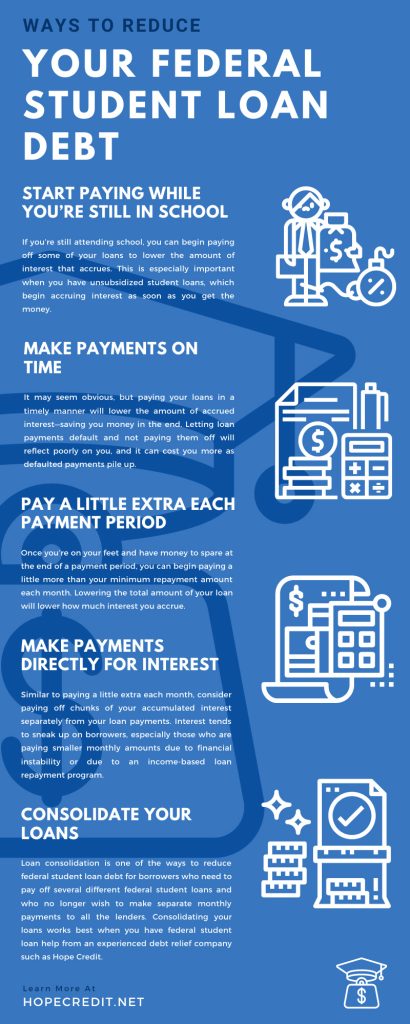Reduce Your Federal Student Loan Debt: Here’s How
Reduce federal student loan debt as early as possible to avoid long-term financial stress. Nobody wants to think about student debt or how much interest is building, but at some point, action becomes necessary. Leaving your federal student debt unpaid can lead to serious financial damage and a poor credit score. While it’s nearly impossible to eliminate debt overnight, there are effective strategies to reduce your student loan debt, whether you’re a new borrower or someone struggling with long-term repayment.
Start Paying While You’re in School to Reduce Federal Student Loan Debt
If you’re still in school, consider making small payments toward your student loans now. This strategy helps reduce student loan debt early and prevents interest from ballooning—especially with unsubsidized loans, which begin accruing interest immediately. Even small contributions during college can save you thousands later.
Make On-Time Payments to Lower Federal Loan Balances
One of the simplest ways to lower your student loan debt is by making consistent, on-time payments. Defaulting causes damage to your credit and adds penalties. If payments become unmanageable, explore income-driven repayment plansor adjusted schedules—but keep in mind that lower monthly payments usually mean more interest over time.
Pay Extra Each Month to Reduce Federal Student Loan Debt Faster
Whenever possible, add a little extra to your monthly payment. This reduces the loan principal more quickly, limiting future interest accrual. Even occasional extra payments can reduce federal student loan debt more effectively than sticking to the minimum every month.
Target Loan Interest Separately
Another helpful tip is to directly pay off accumulated interest apart from your regular monthly payment. This is especially useful if you’re on an income-based repayment plan, where interest can quietly pile up. By paying interest separately, you stay in better control of your overall federal student loan debt.
Choose the Right Federal Repayment Plan
Your current repayment plan may not be the best option for your situation. For example, a graduated repayment planstarts with lower payments and increases over time—perfect if your income is expected to grow. Alternatively, if you have the means to pay more, switching to a standard repayment plan may save you money by reducing interest. Adjusting your repayment strategy is one of the best ways to reduce federal student loan debt over time.
Use Administrative Forbearance Strategically
During the COVID-19 pandemic, the CARES Act introduced administrative forbearance, setting interest rates to 0% temporarily. If you can afford to make payments during a forbearance period, it’s a smart move. You’ll make more progress on your loan principal, effectively helping you reduce federal student loan debt faster than under normal circumstances.
Consolidate Your Loans to Simplify Repayment
If you’re juggling multiple federal loans, loan consolidation may help. Consolidation combines all your loans into a single balance with a fixed interest rate and a single monthly payment. While it may extend your repayment period, it’s an effective strategy for managing complex debt and one more way to reduce federal student loan debt. For help navigating consolidation, reach out to Hope Credit’s student loan specialists.
Stay Organized and Get Help If Needed
Keeping your contact info up to date and managing your repayment plan options is critical. If you’ve already taken steps and still feel overwhelmed, consider working with professionals. Hope Credit offers customized guidance to help reduce federal student loan debt and regain financial control.
Hope Credit can provide you with student loan professionals who can get you through the fear and doubt.
CALL FOR A FREE QUOTE: (760) 916-9313 Or Contact Us: HopeCredit.net/contact-us/

